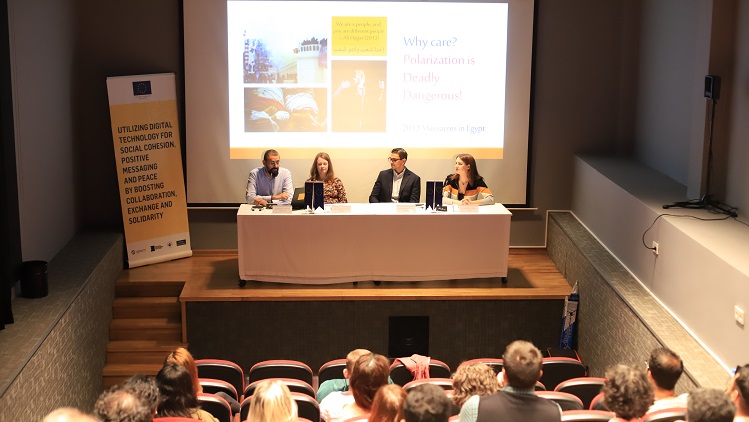Hate Speech, Disinformation and Fact-Checking
Combating Hate Speech and Disinformation Against Social Polarization and How to be a Fact-Checking Influencer

As part of the series organized within the scope of the project “Utilizing Digital Technology for Social Cohesion, Positive Messaging and Peace by Boosting Collaboration, Exchange and Solidarity”, the first panel “Combating Hate Speech and Disinformation Against Social Polarization” took place on Friday, October 7, 2022. The panel was held at the Hrant Dink Foundation’s Havak Hall.
The panel was moderated by Handan Uslu, the founder of Turkey’s first internet monitoring organization Gözlemevi, and Kareem Darwish from aiXplain Inc, Stefanie Ullmann from the Center for Research in the Arts, Social Sciences and Humanities, and Alex Mahadevan, founding director of MediaWise, took part as speakers.
Kareem Darwish mentioned that the spread of misinformation and hate speech can result in hate crimes such as genocide with different examples while talking about social polarization. Darwish stated that polarization can be evaluated through the communication levels of the groups in society with each other and there are two different methods in quantifying this data opinion detection, in and out group bias. He added that there are groupings called ‘echo chambers’ in social media like to the real life segregation, and these segregations can feed discriminatory speech and hate speech. Darwish said that in order to evaluate polarization, first of all different groups should be identified and then, to what extent these groups diverged.
Stefanie Ullmann began her speech by mentioning that online hate speech and misinformation are one of the biggest challenges to democracy and peace. Ullmann shared that online hate speech triggers violence life and brings together psychological violence in real life. She added that the number of hate crimes has also increased. Ullmann mentioned that although the current approaches of social media companies are content moderation, there is an existence process like where the person targeted with hate speech reports that content. She also added that censorship brings ethical problems. Ullmann said that proposed techniques based on artificial intelligence try to move users away from the dangerous field to more positive areas or to direct their attention to different places.
Alex Mahadevan who is the director of MediaWise, digital literacy organization, started his speech by mentioning that verification methods are useful along with the fact that social media platforms spread disinformation and hate speech. Mahadevan stated that in the MediaWise, they aim to increase people’s awareness so they can fact-check the news examples they encounter with the media literacy method for the target group. He explained with examples that manipulated facts can be produced with real media tools and the data can be generalized incorrectly.

How to be a Fact-Checking Influencer?
The workshop “How to Be a Fact-Checking Influencer?” took place on Saturday, October 8, 2022. The workshop was held at the Hrant Dink Foundation by MediaWise founding director Alex Mahadevan with 21 participants aged 14-17.
During the first part of the workshop, the concepts of false and incomplete information and the differences between the two were discussed.The participants were informed about how the practices of producing and disseminating false and incomplete information on social media differ.
Alex Mahadevan stated that youth shares 41% misinformation on social media and that only 28% of information is checked for accuracy before being shared. He also stated that spreading misinformation and not being aware of false and incomplete information causes the misinformation to increase. He made a presentation on the ways to check the accuracy of social media content and shared tips with the participants on how to develop their digital literacy skills as well as the methods for fact-checking.
Mahadevan stressed that incomplete and wrong information was created in social media via missing context, echo chambers, zombie claims, artificial intelligence, and deep fake and he shared examples of these.
The participants were taught how to analyze content on social media as digitally literate users by tracing who shared the information, how to reach the source of the content and how to proof-check the information through different sources. Throughout the workshop the participants received tips on how to verify the accuracy of the information on the internet with the help of binary reading, reading ahead, visual content search and geolocation.